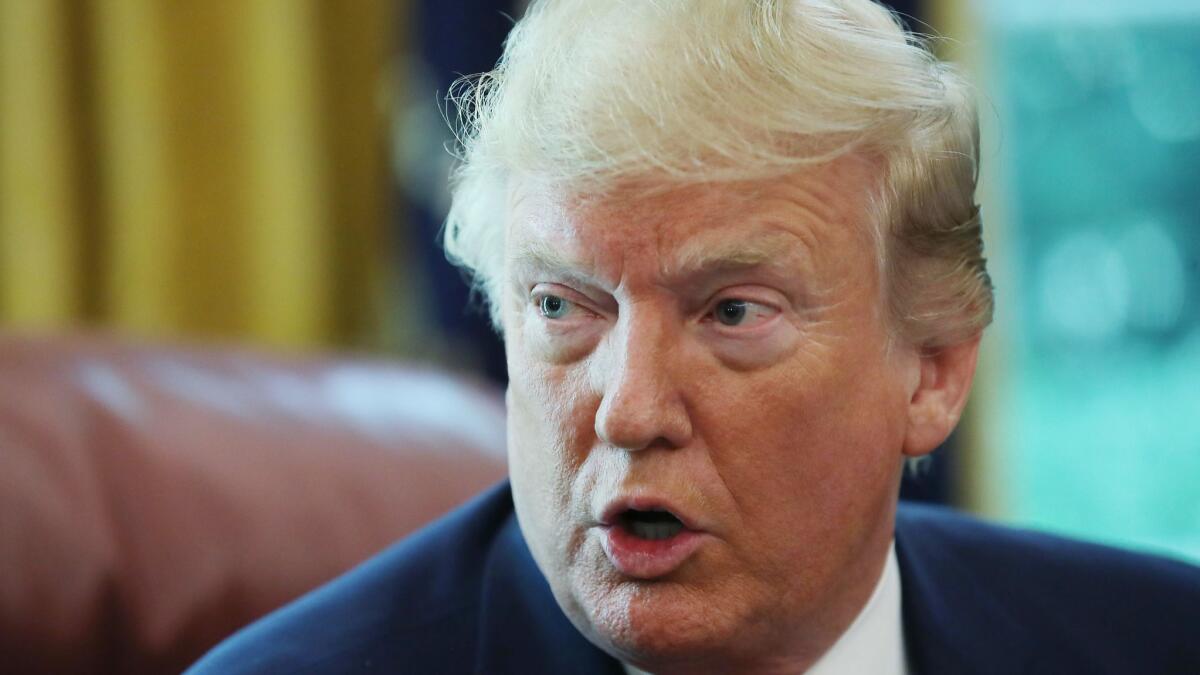Trump’s reluctance to bomb foreign countries is a strength, not a sign of weakness

- Share via
It took less than a week for informed opinion to settle the question: In ordering airstrikes against Iran on June 20 and then cancelling that order at the last moment, President Trump committed an unforced error of enormous magnitude. Writing in the Atlantic, Kori Schake, a noted national security expert, ably recited the fast-breaking conventional wisdom: “Trump has now shown himself just as willing as President Barack Obama was to make empty threats that damage American credibility.” Indeed, according to Schake, Trump’s offense is actually worse than Obama’s.
Recall that back in 2012, Obama had let it be known that any use of chemical weapons by government forces in the Syrian civil war would constitute “a red line for us.” Observers interpreted Obama’s use of that term as tantamount to a pledge: Crossing that line would trigger immediate U.S. punishment. Yet when evidence subsequently suggested that Bashar Assad’s forces had employed chemical weapons, Obama chose not to retaliate. Critics wasted no time in lambasting him for his reticence. American credibility had ostensibly sustained irreparable harm.
Trump has now apparently outdone Obama. The president’s “reprehensible behavior,” Schake wrote, “makes it virtually impossible for him to bring the country together, convince it that war is necessary, and, on the basis of that support, persuade America’s allies to join the fight.”
In other words, to Schake’s evident dismay, Trump has made it difficult for the United States to embark upon yet another war in the Middle East.
But does making threats and then dropping bombs enhance credibility? If so, notwithstanding Obama’s and Trump’s own occasional qualms, the United States would have amassed vast stores of the stuff over the past 30 years or so. Presidents since Ronald Reagan, including Obama and Trump, have followed up threats with bombs on myriad occasions. Targeted nations have included Libya, Panama, Iraq, Somalia, Bosnia, Serbia, Sudan, Afghanistan, Pakistan, Syria and Yemen, with the punitive action episodic in some cases and sustained in others. No nation in recent memory has dropped more pieces of ordnance on more different countries than has the United States. Indeed, no other nation comes close.
It turns out in practice that credibility is less a function of using force than of demonstrating prudence.
Over those same 30 years, however, America’s standing as a global leader has declined. It turns out in practice that credibility is less a function of using force than of demonstrating prudence. Yet somewhere between the fall of the Berlin Wall and the terrorist attacks of 9/11, those charged with formulating U.S. policy decided that the dictates of prudence need not apply to the actions of the world’s one-and-only indispensable nation. In recent decades, the abiding feature of American statecraft has been grandiosity, with military activism camouflaging a loss of strategic realism.
In short, fecklessness in the use of force has undermined U.S. credibility. Testifying before the Senate Foreign Relations Committee in 1966, the renowned diplomat George F. Kennan made the key point. “There is more respect to be won in the opinion of this world by a resolute and courageous liquidation of unsound positions than by the most stubborn pursuit of extravagant or unpromising objectives.”
The subject then was Vietnam. Yet Kennan’s dictum applies today, when the heedless pursuit of extravagant objectives — fantasies of regime change in Tehran offering only the latest example — finds the United States mired in a condition of permanent war.
Enter the Fray: First takes on the news of the minute »
Today the United States has one single overriding interest in the Middle East. That is the restoration of stability. No amount of what the Pentagon euphemistically refers to as kinetic action will stabilize the region. This is a task for creative diplomacy — not for more war, but less.
In his State of the Union Address earlier this year, Trump himself, of all people, stated the matter with rare and commendable clarity. “Great nations,” he declared, “do not fight endless wars.” No doubt Kennan himself would have endorsed the sentiment.
Yet a sentiment is not necessarily a principle or a doctrine. Whether Trump possesses the tenacity or the attention span to initiate a resolute and courageous liquidation of America’s unsound position in the Persian Gulf will seem unlikely to many. Yet should he do so, Americans may yet owe this commander-in-chief a measure of gratitude. And by ignoring those who call for yet more war, he just might begin the process of repairing the damage done of late to this nation’s credibility.
Andrew Bacevich is co-founder of the Quincy Institute for Responsible Statecraft, a new Washington think tank .
Follow the Opinion section on Twitter @latimesopinion and Facebook
More to Read
A cure for the common opinion
Get thought-provoking perspectives with our weekly newsletter.
You may occasionally receive promotional content from the Los Angeles Times.









